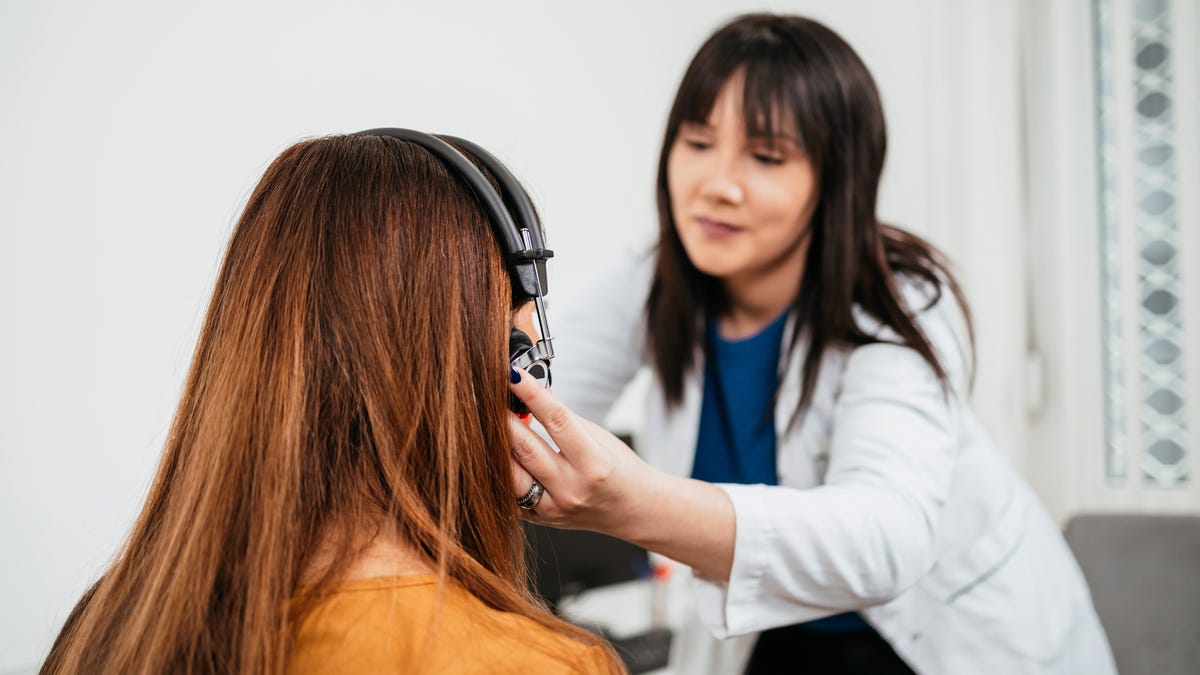Hearing Loss Is More Common Than You Think: 5 Signs You Should Get Tested
Here's what to expect from hearing loss tests, and some signs you'd probably benefit from one.

If you find yourself saying "what?" a lot, you might be starting to wonder about your hearing. You're not alone. Roughly 15% of American adults have some level of hearing loss. The good news? Now that you can access over-the-counter hearing aids, improving your hearing can be pretty simple.
So should you get a hearing test? To answer that, it'll help to understand the signs of hearing loss, the importance of regular hearing checkups and what to expect from them. Let's look at all of that here.
What is a hearing test?
Before we get into the signs you might have hearing loss, let's ease any fears you might have about a hearing screening. If you're feeling uneasy because you don't know what to expect, we can help.
Hearing loss tests are quick, painless processes. Usually, you'll be done in a half hour or less.
Your certified audiologist generally tailors the hearing screening to you. Some of the more common types of hearing tests include:
- Pure-tone tests that evaluate the quietest volume at which you can hear certain pitches.
- Speech tests during which you listen to and try your best to repeat words and phrases.
- Tests to see if there's fluid or wax buildup in your ear, like bone conduction testing and tympanometry.
- More specialized testing like auditory brainstem response (ABR) or otoacoustic emissions (OAE) tests.
Pure-tone testing and speech testing are the most common hearing tests. With a pure-tone hearing test, you sit in a soundproof room. You'll wear a set of headphones through which your audiologist sends sounds at different pitches and volumes to one ear at a time. You signal when you hear the sound, usually by raising a hand or pressing a button.
Speech testing functions similarly, but instead of hearing tones, you hear words and are asked to repeat them. Your audiologist evaluates the lowest volume at which you can still clearly make out the words and phrases.
The American Speech-Language-Hearing Association recommends that all adults get hearing loss tests every decade until age 50, after which point they should get regular hearing checkups every three years. Remember, getting hearing aids is easier now thanks to over-the-counter options, so there's no reason to drag your heels here.
Importance of regular hearing checkups
Hearing loss generally happens gradually. In fact, it can happen so slowly that you don't realize that your hearing has deteriorated over time. The ASHA reports that adults wait an average of nearly nine years before addressing their hearing problems, largely because of this issue.
In other words, even if you think your hearing is fine, you might benefit from periodic hearing loss tests. Under age 50, you can go 10 years between hearing checkups unless you notice any of the signs we're about to outline. Because hearing often deteriorates with age, though, you should bump up to regular hearing checkups on a triennial basis once you hit your 50th birthday.
If you skip hearing screening, you might inadvertently change your life to make up for hearing loss. You might avoid crowded settings because you have trouble hearing with background noise, for example, or increase the volume in your headphones, which can further damage your hearing. Ultimately, hearing tests can help you not just check how your ears function and also protect them and your quality of life.
5 signs you need a hearing test
If you're due for a hearing test per the ASHA recommendation, schedule yours. Even if you haven't crossed the recommended timeline, you might need to get your ears checked if these signs sound familiar:
- Saying "what?" a lot -- If you have to ask people to repeat themselves on a regular basis, it likely means your ears aren't working as well as they should be.
- Hearing ringing in your ears -- Hearing loss often goes hand in hand with tinnitus, which causes that persistent ringing. So even if you think you're hearing fine, if you've got a regular ringing in your ears, it's worth talking to an audiologist.
- Pumping up the volume -- Do you often listen to your headphones at or near full volume? Do you turn up the volume on the TV and in the car? If so, you might be compensating for hearing loss.
- Struggling to hear amid background noise -- Does your ability to hear clearly deteriorate as background noise increases? If you struggle at parties and other loud environments, you're likely living with some level of hearing loss.
- Embarrassment in social situations because you can't hear -- Sometimes, difficulty hearing can lead to social gaffes. If you've ever wrongly assumed someone said something because you didn't want to ask them to repeat themselves, for example, hearing loss could be to blame.
The National Institute on Deafness and Other Communication Disorders has an online questionnaire you can take to help you find out if you would benefit from a hearing screening.
If you think you do need a hearing test, the ASHA recommends that Americans get hearing loss tests performed by a certified audiologist. Your doctor should be able to refer you to one.
Bottom line
Many adults live with some level of hearing loss, often without knowing it. That's why regular hearing checkups matter. If any of the signs we just laid out sound familiar, schedule a hearing test for yourself.
Plus, if you catch your hearing loss early when it's mild to moderate, over-the-counter hearing aids can likely help. Before you jump in with them, though, see a certified audiologist and weigh some key considerations.